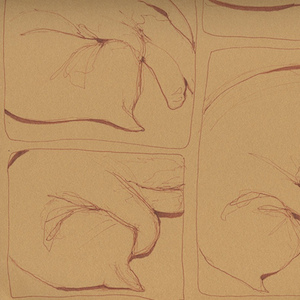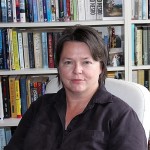Small Lives

Seven years old and visiting my father’s aunt in Mullingar. Her house is full of cats. They sprawl on the table and saunter across counter tops. My mother sits on the edge of her seat, refusing tea, while my sisters and I run around the living room, trying to coax the kittens out from under the couch.
“Would you like to bring one home?” my aunt asks, and my mother’s mouth forms a thin, hard line. She shakes her head no and refuses to budge, despite our pleading, despite our father’s pleading. Later, we pile into the car and sit in sullen silence, waiting for Dad, who’s taking his time saying goodbye. Finally, he steps out of the house carrying a cake box tied with string. “Nellie wanted you to have some cake,” he says, handing me the box and winking. “Be careful you don’t squash it.”
I look at the box. A scattering of holes punched in its cardboard lid. I’m afraid to think what those holes might mean. I sit between my sisters, and hold the box tightly, all the way from Mullingar to Dublin.
When we pull into our driveway, my mother turns to me. “You’d better get that kitten some milk,” she says. “And make up a bed for it in the shed.”
I jump out of the car and dash towards the door.
“And don’t let it into the house,” she shouts after me.
*
When I’m eight, I spend the summer trying to catch pigeons. I set up a trap in the garden, an upside-down milk crate propped up on one side by a stick. I put some bread under the crate, tie some string around the stick, then retreat behind a wall. I plan to pull the string as soon as a pigeon ventures under the crate, although I’m not sure what I’ll do with the pigeon after I’ve caught it. I last ten minutes on the first day before I give up. The following day, I bring a book with me on pigeon-watching duty.
That summer I become a reader.
*
We stay with my uncle Joe in the country. He goes off to the lake one night and returns with a six-pound salmon. My aunt takes the salmon and cooks it on the frying pan, even though we’ve already eaten dinner. She tosses some butter on the cooked fish, and less than an hour after it’s been caught, I taste salmon for the first time.
*
My younger sister is diagnosed with epilepsy. To compensate, my mother offers to buy her anything she wants, and is thus blindsided into buying two budgies. The birds sing at inconvenient times. My mother takes to throwing a tea towel over the cage at six o’clock so she can hear the evening news.
*
One day, I walk into the garage. A hare is hanging from the door jamb, its eyes staring straight ahead. A present for my father. The hare hangs for a couple of days and then my father calls some friends to help. They spend an evening skinning and gutting; I hear them laughing and talking as they work. Someone makes hare soup. I refuse to taste it.
*
Some mornings I wake early and bring in the milk from the porch. I open the door carefully, hoping to catch the birds balancing on the tops of the bottles, pecking through the foil to get to the cream beneath.
*
My oldest sister wants to go abroad for a year and my parents are desperate to stop her. My father has an idea. He buys her a Springer Spaniel, an expensive show dog named Sherry Girl, whose future is now so removed from dog shows and parade rings that we immediately rechristen her Tara. My sister falls in love with Tara, but packs her bags anyway, leaving me in charge of Dad’s great idea. Six months later, she falls in love again, this time with a handsome foreigner, and sweeps home to claim her dog and move abroad permanently.
*
I’m standing on top of the Cliffs of Moher, beside the man I am going to marry. It’s a spring day, all blue skies and scudding white clouds. Below us, the Atlantic stretches away, pointing to America, to the new life we’re planning.
We stand at the edge of Ireland, looking west. Silent.
A fishing boat bobs in place, its occupants hauling net after net of mackerel onto its deck, a flash of silver their only obituary.
*
We wake to a rustling sound, creep out of our ground floor bed, and slip open the blinds. A doe is standing in the dawn light, munching apples from our tree. She turns her head and looks at us, waiting to see what we’ll do. We creep back to bed.
*
I carry a box of Christmas decorations into the kitchen from the garage. I open the box and reach in, parting the straw in search of the Three Wise Men. A dead mouse stares up at me, four baby mice curled around her. I slam the lid closed and shout at my husband to take the box, quick. Later that night, I tuck my children into bed. I think of the mouse crawling into the box, settling into the warm straw with her babies. I never hate mice again.
*
Cicadas arrive, with shrimp-sized bodies and translucent wings. They emerge from the ground after a seventeen-year wait, cling to the windscreen until I turn on the wipers and flick them away. The ground is covered with discarded shells that crunch underfoot and skid across the deck. Their chirping is deafening. They swarm in their thousands, buzzing like generators or chainsaws.
*
A robin lays her eggs in one of our flower baskets. We check on the eggs every night until finally, the chicks hatch. My husband lifts the children up to see our new neighbours, one child in each arm.
*
The children call and point outside to a squirrel whose tail is caught in the net of a toy soccer goal. The squirrel is trying to walk along the fence, dragging the goal behind him, becoming more and more entangled.
“Stay here,” I tell them. They stare at me with solemn eyes as I take a pair of scissors and step through the door. I walk across the grass, trying to remember whether squirrels carry rabies, and position myself beside the fence, as far behind the squirrel as possible. I reach in and start cutting the net away from its tail, my body alert, ready to sprint if the squirrel decides to lunge. When I snip the last of the threads, the goal falls to the ground with a soft bounce. The squirrel takes off along the fence and scampers up a tree.
I stride like a God across the garden. The kids look at me in awe. Then I climb into the shower and scrub myself raw.
*
I’ve just put our oldest girl on the school bus when the phone rings. It’s my brother in Ireland. “How are things?” he asks. “How’s John?” I tell him John’s fine, in the air as we speak, on his way to a conference in Boston. My brother hears only “in the air” and “Boston”. He is standing in his office in Ireland watching the news.
It’s September 11, 2001.
Weeks later, I’m sitting in the living room when the sky turns black. An enormous flock of starlings swoops down and lands on every surface, blackening the lawns, the roofs, the telephone lines. I stand and watch as wave after wave of birds arrive, darkening the day, erasing its hues. Then, as if in response to some unseen force, the birds rise together and wheel away in a great clattering circle. I’m breathless at the choreographed immediacy of it – the synchronised ascent of living things.
The synchronised departure of living things.
*
I stand in the garden of our Cincinnati home, looking at the ‘Sold’ sign at the end of the driveway. The afternoon sun is hot, and I’m about to retreat indoors when I notice what looks like a swarm of insects around the mimosa tree. I find some binoculars and look through the glass. A mass of ruby-throated hummingbirds is hovering midair, feasting on the mimosa’s flowers. I’ve lived in Cincinnati for twelve years, and never once seen this tiniest of birds. Now, just days before I move back to Ireland, I’m dazzled.
*
Our five-year-old daughter wants a dog. She asks for one first thing in the morning and last thing at night, but we live in a rented house and having a dog is not practical.
My mother dislikes dogs, but she loves my daughter. She listens to her plead with me for several months until she finally snaps. “Get that child a dog,” she orders, and I’m so stunned I immediately begin reading the Puppies For Sale ads.
Three days later, we surprise my daughter. My husband walks into the room holding a tiny, black and white puppy. My daughter reaches out her arms and sighs. “My dog,” she says, as if we’ve restored something elemental to her, as if we’ve found something she lost a long time ago.
The dog is the runt of the litter and nervous. The kids crowd around him, excited and loud, until finally I banish them from the house. I have no idea how to calm a crying pup, but I know how to calm a crying baby. I lie on the couch and put the pup on my chest. He settles down and we both fall asleep.
*
My oldest daughter asks if she can do a week’s voluntary work at the dog pound. “As long as you don’t ask to bring home one of the dogs,” I warn. She works stoically from Monday to Thursday. On Friday, she sends me a photo of a Jack Russell and a text with a single word: “Please?”
*
The goldfish is ill, swimming at an odd angle. Every morning, I come downstairs, expecting to find him floating in his bowl, but his death is prolonged and painful to watch. There’s nothing I can do. “Go ahead and die,” I shout at him one day, but he just keeps swimming, more and more slowly.
*
Snow blankets the city. I wake early and walk out to survey the streetscape. A fox walks down the centre of the road, solitary, imperious. I look at it as it walks past, try to fix the moment in my mind. The fox tosses its head carelessly, ephemeral in the morning light, snowflakes dappling its tail.
*
I’m driving in the sunshine and a song I like comes on the radio. I pull into the driveway and stay seated, listening to the words, feeling the sun on my face. A swan rises from behind my neighbour’s roof, beating slow wings as it climbs into the blue, the rhythm of its wings blending with the rhythm of the song and the feel of the sun and the memory of something sweet and simple and long ago.
Read The Story Behind “Small Lives” on our blog.










